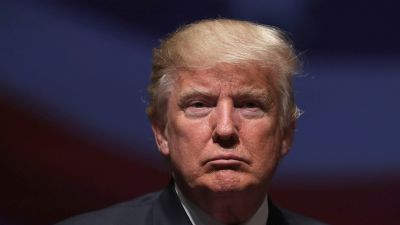
Senate Minority Leader Mitch McConnell, Jan. 22, 2013. (AP Photo/J. Scott Applewhite)
Justice Ruth Bader Ginsburg died 45 days before the election. As her strength waned, she dictated this statement to her granddaughter: “My most fervent wish is that I will not be replaced until a new president is installed.”
It says something unfortunate about the state of the republic that she voiced such concerns on her deathbed.
Less than 90 minutes later, Senate Majority Leader Mitch McConnell (R-KY) announced that Trump’s nominee would get a vote on the Senate floor because “Americans…expanded our majority in 2018.” He didn’t mention that only one-third of all senators ever faced re-election in the 2018 midterms, or that voters in that election repudiated Republicans nationwide as they put Democrats in control of the House where every seat was in play.
Less than 12 hours after McConnell’s statement, Trump tweeted that Republicans should confirm her replacement “without delay” to serve the will of “the people who so proudly elected us.” He didn’t mention that “the people” who voted for him didn’t constitute even a plurality of the popular vote in 2016. Almost three million more wanted his opponent.
Meanwhile, US deaths from COVID-19 passed the 200,000 mark, evidence of his reckless disregard for public health mounts and polls consistently show former Vice President Joe Biden with a commanding lead over Trump.
The McConnell Rule
McConnell has moved quickly before, but in the opposite direction. Within hours after Justice Antonin Scalia’s death on Feb. 13, 2016 — nine months prior to the presidential election — he announced, “The American people should have a voice in the selection of their next Supreme Court Justice. Therefore, this vacancy should not be filled until we have a new president.”
Almost every Republican in the Senate followed his lead.
McConnell is now facing what at times has been a surprisingly competitive race to retain his Senate seat. At least eight other senators who lined up behind him in 2016 are also now in tough re-election contests. Here’s what they said back then:
- Lindsey Graham (R-SC): “I want you to use my words against me. If there’s a Republican president in 2016 and a vacancy occurs in the last year of the first term, you can say Lindsey Graham said let’s let the next president, whoever it might be, make that nomination. You can use my words against me and you’d be absolutely right. We are setting a precedent here today. Republicans are.” (Mar. 10, 2016) Here’s the tape:
- Cory Gardner (R-CO): “We stand at a pivotal point in our nation’s history…[T]he next president of the United States should have the opportunity to fill the vacancy on the Supreme Court.…[T]he American people deserve a role in this process as the next Supreme Court Justice will influence the direction of this country for years to come.” (Mar. 16, 2016)
- Thom Tillis (R-NC): “We are in the middle of a presidential election, and the Senate majority is giving the American people a voice to determine the direction of the Supreme Court.” (Mar. 16, 2016)
- Dan Sullivan (R-AK): “The next Supreme Court justice could fundamentally change the direction of the Court for years to come. Alaskans deserve to have a voice in that direction through their vote, and we will ensure that they have one.” (Mar. 16, 2016)
- Steve Daines (R-MT): The American people have already begun voting on who the next president will be and their voice should continue to be reflected in a process that will have lasting implications on our nation. The US Senate should exercise its constitutional powers by not confirming a new Supreme Court justice until the American people elect a new president and have their voices heard.” (Mar. 16, 2016) By “have already begun voting,” Daines was referring to the primaries.
- Joni Ernst (R-IA): “In the midst of a critical election, the American people deserve to have a say in this important decision that will impact the course of our country for years to come.” (Mar. 16, 2016)
- David Perdue (R-GA): “What’s at stake here is the balance of our nation’s highest court and the direction of our country for decades. I remain firm in my decision to exercise my Constitutional authority and withhold consent on any nominee to the Supreme Court submitted by President Obama.” (Mar. 16, 2016)
- John Cornyn (R-TX): “At this critical juncture in our nation’s history, Texans and the American people deserve to have a say in the selection of the next lifetime appointment to the Supreme Court. The only way to empower the American people and ensure they have a voice is for the next president to make the nomination to fill this vacancy.” (Mar. 16, 2016)
Similar arguments in 2016 came from others now facing re-election and holding what are considered “safe” Republican seats, including Sens. Mike Rounds (R-SD), Jim Inhofe (R-OK), Shelly Moore Capito (R-WV), and Tom Cotton (R-AR), who is on Trump’s short list of potential Supreme Court nominees.
Rejecting Principle for Political Expediency
Now that McConnell has reversed a rule that he created to block President Obama’s nomination of Judge Merrick Garland, will Republicans continue to play Calvinball with him? This time, they’re tied to an unpopular, uncontrollable president who has crashed through democracy’s guardrails repeatedly.
Graham made his decision. Now chairman of the Senate Judiciary Committee that will consider the nomination, he has promised to move it forward. In 2016, he proposed the remedy for such hypocrisy: “You can use my words against me and you’d be absolutely right.”
Tillis and Cornyn are also on board. In July, Ernst said she would support hearings for any Trump nominee this year.
The Day of Reckoning
For Republican senators in close re-election races, the abandonment of principle in favor of personal loyalty to an unpopular president is a gamble: Will energizing Trump’s shrinking base outweigh the loss of moderates they hope to sway?
The alternative is to speak out now, as Sen. Susan Collins (R-ME) has:
“Given the proximity of the presidential election…I do not believe that the Senate should vote on the nominee prior to the election. In fairness to the American people, who will either be re-electing the President or selecting a new one, the decision on a lifetime appointment to the Supreme Court should be made by the President who is elected on November 3rd.”
So far, only Lisa Murkowski (R-AK), who is not up for re-election, has followed Collins’ lead.
In fact, all Republican senators — not just those facing re-election — face a dilemma. They know that if Trump were not a sitting president, he would be on the receiving end of criminal indictments. If they want to retain a shred of personal integrity and help preserve the public’s faith in America’s foremost governmental institution — the Supreme Court — they will defy him. But that means incurring the wrath of a vengeful president who cares only about himself.
However they resolve the dilemma, some individual senators will sacrifice their careers in the process. Those who choose Trump over country will put an ugly capstone on their legacies. That’s the price many Republicans will pay for allowing their party to become Trump’s host species.
It’s also why, as the fable goes, you don’t pick up a poisonous snake. It always has the last word: “You knew what I was when you picked me up.”






